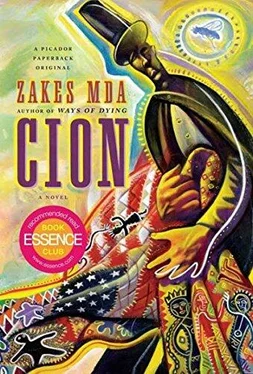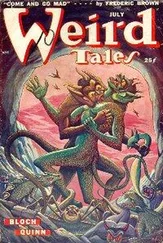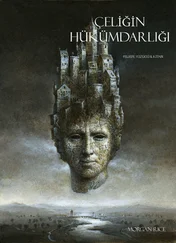And here today Orpah is dismissing his nostalgia for the war he didn’t personally fight as stupid and boyish, and that no one in their sane mind would be happy for a situation that produced so much collateral damage. While Ruth shushes Orpah for talking rubbish about people who are fighting for America’s freedom, Obed makes an observation along the lines that every truth has its counter truth; one man’s collateral damage is another man’s slaughter of the innocents.
Oh, yes, Orpah has changed! But nothing else has changed in Kilvert. Obed continues with his quest for the occult. He becomes Shawnee or Cherokee depending on the weather. He dabbles in everything that is remotely connected with his heritages, from the smoke scrying of the Native Americans to something he calls hakata, which he says is used by African witchdoctors. He does not believe me when I tell him that where I come from there is no such thing as a witchdoctor — that it’s a contradiction in terms. And as always there is a strong profit motive whenever he engages with mysticism. I never get to know what smoke scrying and hakata entail, although he does make a few bucks from the practices. But soon he gets bored with them and tries something else.
He does not get bored with Beth Eddy though. I suspect something has developed between them, although we never get to see the lady. He does not boast about her as he used to with his previous conquests. Some awe seems to surround Beth Eddy’s name. His dream is that one day Kilvert will be declared a Native American reservation and he will have his own casino. And maybe, only maybe, someone like Beth Eddy will be with him to share the spoils when that happens. Ruth, of course, pooh-poohs such dreams. She declares: “That’s why them Indians don’t get nowhere and are always so drunk. They sold their souls to the devil with them casinos.”
She continues to poke her nose into everything that happens in Kilvert and accelerates her fundamentalist campaign against Brother Michael, who stubbornly stands his ground on the slave quilts: enslaved Africans could not have been intelligent enough to devise such an elaborate code or any code whatsoever. An adulterer is bound to say such things, Ruth declares.
She continues to sew her ancestral designs and to take her quilts to the farmer’s market where no one buys them. People don’t see any artistry in them. They see wonderful craftsmanship but no artistic vision. She is like a performer of traditional music who does cover versions of songs long composed by others in that genre, instead of composing new songs in the same traditional genre, or at least giving the old ones a new twist, a new angle, a new life. Yet she continues to destroy Orpah’s designs because Orpah’s designs are not part of the tradition and have no names since they are of her own origination.
As for me and Orpah: I have given up on her, as I stated earlier. I think for her I am just convenient for defending her designs and hiding them from Ruth. I therefore no longer take it upon myself to hide them. Ruth is aware of this and our relationship has improved as a result.
Orpah, on the other hand, continues with her obsession with ghost orchids. For a long time Mahlon searches for them in vain. I do not know if he is merely playing along or not, but he searches earnestly. Until Orpah begins to despair for him. He feels he has failed his daughter. Orpah does not understand why the ghost orchids are nowhere to be found. She has never seen them in the wild in all her life growing up in Kilvert, but she believes that the only reason is that the ghost orchids that grow in the wild are reputed to be very elusive. Perhaps it is the wrong season. She must find out when the ghost orchids are usually in bloom and the best source for that kind of information would be Brother Michael since she got her orchid from him. To her consternation she discovers that her father’s search is a futile one: ghost orchids do not grow in these parts. Mahlon would have to go to southern Florida to find any ghost orchids in the wild. Or perhaps sail to the Caribbean. The one she now possesses was confiscated from a thief who had stolen it from one of the glorious trees of the Fakahatchee.
Instead of calling off the search, Orpah creates her own ghost orchids from thin plastic material and sticks them on the sycamore trees. Where else should ghost orchids grow but on ghost trees?
I observe all these things silently. At first I don’t understand what is happening. But the saga of the ghost orchids becomes clearer as it unfolds.
Orpah continues to bug me. She asks me to accompany her to the Silent Chinese Auction at the Center one Saturday morning.
“Why don’t you go with Nathan?” I ask her.
“He didn’t ask,” she says. “Anyway the auction is from ten this morning…to two. Nathan’s at work.”
“Well, maybe you should go with your father,” I suggest.
“I’m sure he’ll be there as well. I wanna go with you.”
I was going to go to the auction in any event. And so Orpah and I walk silently to the Center. She would be exquisite if it were not for her heavy makeup that almost cakes her face and the loud, mostly plastic, jewelery.
There are cakes, pies, hot dogs and sloppy joes on one of the long tables. I buy Orpah a hot dog and we walk from table to table looking at the wares. All these have been donated to raise funds for the Center so that it may pay its utilities and purchase more food from the food bank. There are children’s toys, boxes of cutlery, cookbooks, television sets and the ubiquitous quilt. There are also washing machines, sewing machines, a new bike and a number of other household items. Next to each item there is a sheet of paper where one writes one’s bid.
Mahlon is glaring at me, sans the smile. I did not know he was capable of not smiling. I have seen him smile at the worst of times. Why, even when a fight was imminent between Nathan and Obed he was smiling. But here he is, looking at me with a smileless face. He certainly does not approve of my “date” with his daughter. Hard luck; I am with her now. And to emphasize that point I grab her hand, which takes her by surprise. But she does not draw it away. She greets him and he responds with a smile. But his face becomes stern again when his eyes shift to me. Orpah adopts the voice of a little girl when talking to Mahlon. I find this very unsettling.
Orpah is fascinated by a gnome. She tops the last bid on it and I am amazed that people want this gnome so much that they are willing to pay a very high price for it. Orpah explains that this is not just any old gnome. It is a famous George W. Bush gnome invented by one Sam Girton, an Athenian no less, and it sells internationally on eBay and always creates a flurry of bidding. It comes with accessories: If you love Bush then you place an American flag in his hand. If you hate Bush you make him hold a bag of money with a dollar sign on it or a machine gun. The gnome is popular with Bush haters and Bush lovers.
“I didn’t know you’d be interested in this sort of thing,” I say.
“It’s not for me,” she says. “I’m buying it for you to give to Daddy as a present.”
“Why would I give your father a gift?”
“Because he don’t like you and you want him to like you.”
“I don’t want him to like me.”
“You staying at his house.”
She says she is not going to move away from the gnome so as to outbid anyone who has the intention of topping her bid. And she does so. I have never seen her this happy before. She whispers to me why it is necessary to appease her father. For some time now he has been trying to sabotage my stay at the house. For instance, he was the one who “lost” the key to the cellar and I had to find a place to sleep in Obed’s room. I remember the night but didn’t know Mahlon had anything to do with it. She finds this very funny and laughs. Now I hear that he has done other things too, but they were always foiled by none other than Orpah. Obviously she is enjoying what she perceives as rivalry between her father and me.
Читать дальше












